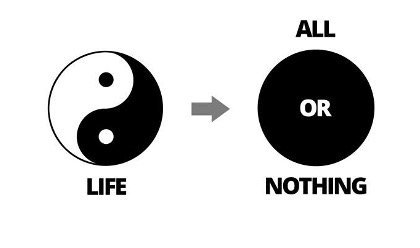Now something that may or may not be a secret: The ones who care about their achievements, performance or abilities the most, usually have the strongest imposter syndrome.
I mean, have you ever doubted your ability to brush your teeth, chew your food or even blink?
We know imposter syndrome is annoying to deal with. It drives us to go above and beyond what we need to do to feel 'competent’. We’re then told we are indeed competent (by working very hard to prove ourselves), but the imposter syndrome and self-doubt only gets stronger.
Do we deserve the recognition? Were we just lucky?
“Pretty sure others are more deserving than me. I’m not as good as they think. I’m really just winging things.”
Seriously, you’re not the only one. Don’t believe that you are.
Look, maybe there are some magical humans in the world who’ve never experienced self-doubt before. Or maybe they did, and they didn’t think much of it. The fleeting moments of self-doubt disappear so quickly that they weren’t aware of it. Some tell you they’ve never doubted themselves and can’t relate to your feelings.
Great, now you feel silly. Well, in actuality, all you found is someone you shouldn’t speak to about self-doubt and anxiety.
You see, the average human (apparently up to 82% of us) has experienced imposter syndrome. So don’t let it discourage you from finding someone you feel safe enough to talk to about your thoughts and feelings.
Okay, fine. I’ll accept that I can experience it and it’s normal. Now what? Help me get rid of it!
Hold your horses, do you really need to?
Since we’re all about sharing secrets here: imposter syndrome is not entirely bad (actually, it’s not even a syndrome). It’s okay to experience anxiety and fear. It’s okay to have negative thoughts about yourself. It’s okay to be doubtful sometimes.
What is not okay is letting the anxiety, fear, or negative thoughts, take over and prevent you from setting healthy limits to your workload, allow you to discount your achievements, or even compel you to turn down deserving opportunities. If you’re thinking of doing any of these, here are our tips for you:
Ψ Take a second, and zoom out.
Consider what brought about this wave of anxiety and self-doubt.
Was there a new and unexpected challenge you’re facing? A new responsibility? Have you only just started out in whatever job or environment you’re in? What are the expectations of this job or task? Are these expectations coming from you (i.e., thinking you need to ace this, and that you can’t fail) or from others (i.e., your boss telling you this is an important job)?
More importantly, are the processes or requirements to meet the expectations clear? Do you know what the action steps are to get the job done ‘satisfactorily’? If so, are these realistic?
Ψ Gather objective feedback.
Don’t rely on only one source. Consult multiple trustworthy persons to gather feedback or evidence of your abilities or performance. This includes mentors, managers, work colleagues, friends, family and even past employees who may have been in a similar position.
Ask them for advice. Ask them how long it took. Ask them what was required to do things well. Ask them whether they think what you’ve been doing is sufficient or whether you’re on the right track. If the feedback is generally positive or reassuring, then you know. You’re the only one doubting yourself.
Ψ Commit to trying and learning.
Maybe a part of you just doubts your abilities. Maybe the feedback tells you that you’re not “there” yet, although you have potential. Maybe your achievements are indeed shared with other contributors. Maybe there are genuine reservations in accepting a promotion.
Rather than resign yourself to “yes i’m just an imposter”, take it as a sign that your mind (or heart) is telling you it wants to grow. Spur yourself to try, learn, fail, and grow. But set realistic limits, expectations, a timeline, and commit to taking action - regardless of the outcome.
Ψ Remember there are other sides of you, and life.
Spend time cultivating different interests and skills. Meet new people with unique perspectives. Read different types of material or explore new hobbies. Invest time with the “old” things that still matter - loved ones, hobbies, priorities.
Life isn’t so black-and-white. Don’t confine your self-worth to only your achievements or abilities. You can care about them, while caring about many other things. So it’s okay to give it a little less weight when it’s too heavy. No one said you can’t!


















